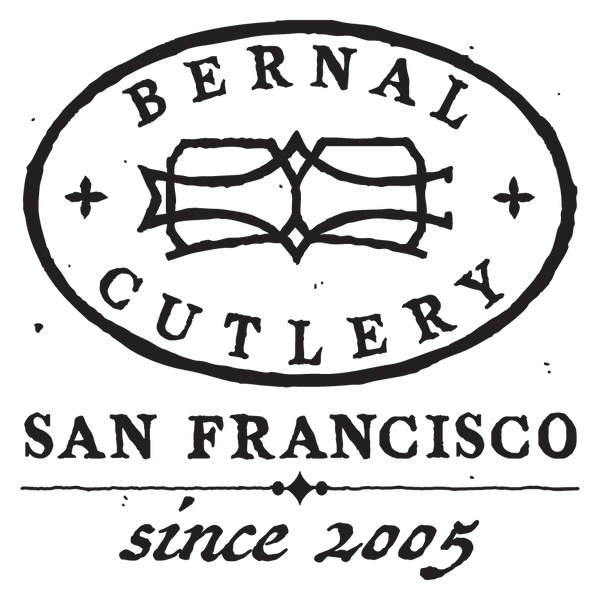Please read our message regarding changes regarding tariff impacts.
The last day to drop off sharpening for the holiday is Saturday, November 1st.
-
Langue
-
Devise
-
NEW
- All New Products
- New Kitchen Knives
- New Kitchen Tools
- Latest Vintage
- New Pocket & Outdoor
- New Pantry
-
What's in my Basket Series
- Nite Yun - Lunette
- Scott & Frost Clark - Dad's Luncheonette, Chef & Author
- Angela Wilson - Avedano's
- Susan Kim - Eat Doshi
- Seth Stowaway - Osito
- Dr. Harold McGee - Author
- Ryo Sakai -Kuma Sushi
- Ian McNemar - Woodworker, Instructor
- Anna Voloshyna - Author
- Jorge Martinex Lillard - Lolo´
- Chris Yang - Piglet & Co
- Griffin Wilson - @cabincorn
- Gabe Rudolph - Gestura Utensils
- Molly DeCoudreaux - Food Photographer
- Geoff Davis - Burdell Soul Food
- Jen and Wes - @crazythickasians
- Josh Donald - Bernal Cutlery
- Kelly Kozak - Bernal Cutlery
- Jessica Sullivan - Poppy SF
- Sylvan Mishima Brackett - Rintaro
- Michael Myers - Film Character
- Ali Hooke - @alihooke
- Bruce Hill - The Chef's Press
- Dylan Carasco - Butcher's Guide
- Spencer Horowitz - Hadeem
-
Japanese Knives
- Ashi Hamono
- Gihei Knives
- Godo Tadaharu
- Hatsukokoro
- Hitohira
- Iwasaki Kamisori
- Kaji-Bei
- Kamo Shiro
- Kanehide
- Konosuke
- MAC Knife
- Masakane
- Makoto Tadokoro Marushin
- Morihei
- Myojin Riki Sesakusho
- Nakagawa Hamono
- Naozumi
- Nigara Hamono
- Sakai Kikumori
- Shigefusa
- Tagai
- Takada no Hamono
- Tanabe Tatara
- Tosa
- Tsukasa Hinoura
- Yoshikane
- Yoshikazu Tanaka
- Wakui
-
Global Knives
- Alma Knife Co. (USA)
- Astral Works (USA)
- Au Sabot (FRA)
- AZ Knives (ARG)
- Benchmade Cutlery (USA)
- Bernal Cutlery (USA)
- Blenheim Forge (GBR)
- Chazeau Honoré (FRA)
- Dexter Russell (USA)
- Eichenlaub Tableware (DEU)
- Florentine Kitchen Knives (ESP)
- Fontenille Pataud (FRA)
- Friedr Herder (DEU)
- J Adams (GBR)
- John Nowill & Son (GBR)
- K Sabatier (FRA)
- Pallares (ESP)
- Roland Lannier (FRA)
- Rolin Knives (USA)
- Silverthorn (USA)
- Steelport Knife Co. (USA)
- Windmühlenmesser (DEU)
- Zirh (TUR)
-
Styles
- Bernal Cutlery Collaborations
- Knife Sets
- Japanese Kitchen Knives
- Western Kitchen Knives
- Chinese Style Cleavers
- Bread
- Butchery
- Cheese | Charcuterie
- Pocket | Folding
-
Outdoor
- A Wright & Son (GBR)
- Au Sabot Folders (FRA)
- Benchmade (USA)
- Buck Knives (USA)
- David Margrita (FRA)
- Friedr Herder (DEU)
- Fontenille Pataud (FRA)
- Helle (NOR)
- Higonokami
- Hults Bruk Axes (SWE)
- Ibberson (GBR)
- Joseph Rogers & Sons (GBR)
- Kalthoff Axes (SWE)
- MOKI Knives (JPN)
- Morakniv (SWE)
- Opinel (FRA)
- Pallares (ESP)
- Tactile Knife Company (USA)
- Wood Tools (GBR)
- Vintage & New Vintage
- Woodworking | Hobby | Craft
- Kamisori Razors
- Carving Forks | Knives | Sets
- Table | Steak
- Fixed Blades | Axes | Outdoor Tools
- Scissors | Shears | Snips
- Left Handed
- Vintage
- Sharpening
- Kitchen | Cookware
- Tableware | Service
- Pantry
- Accessories
- Deals
- Gift Cards
- INFO
ou
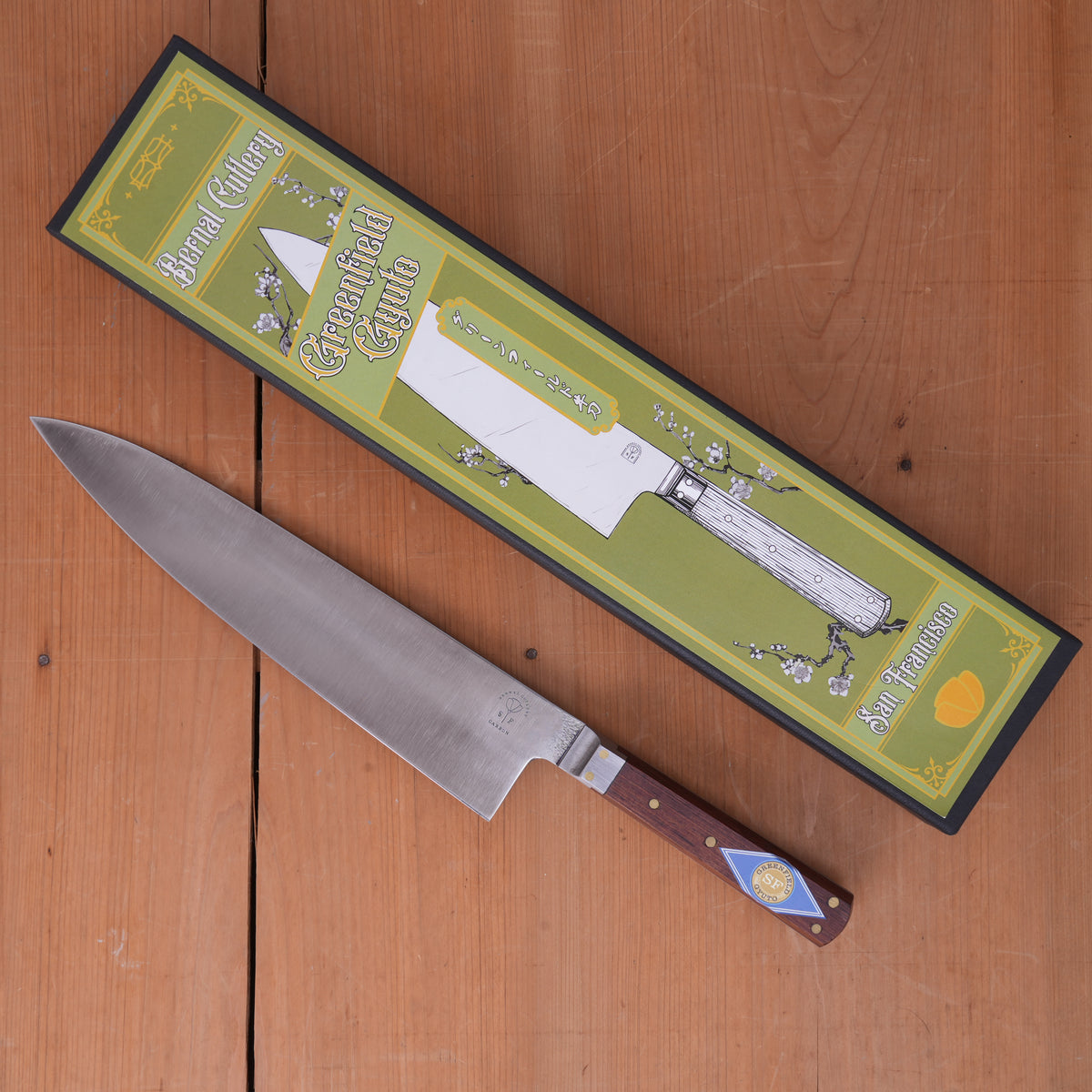
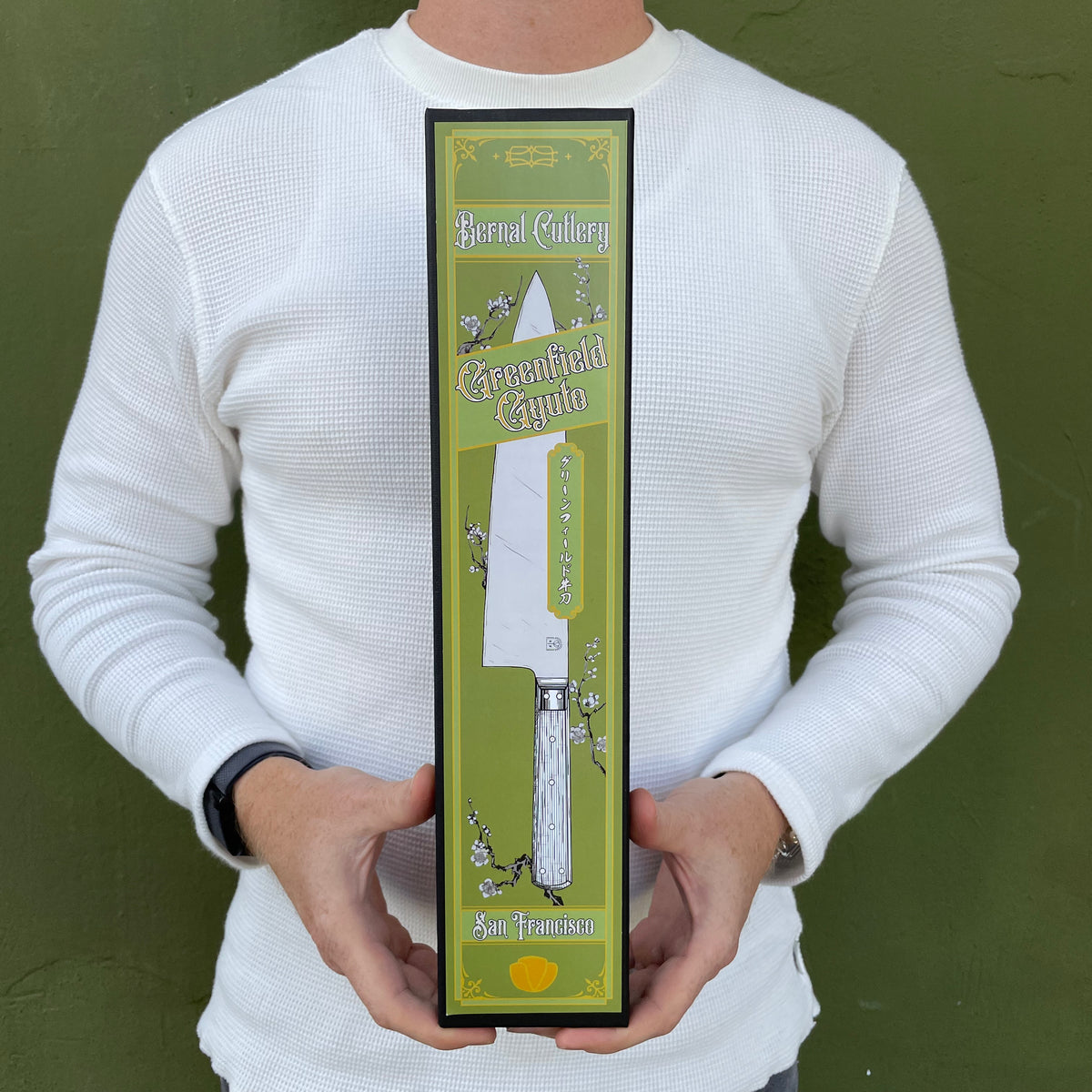
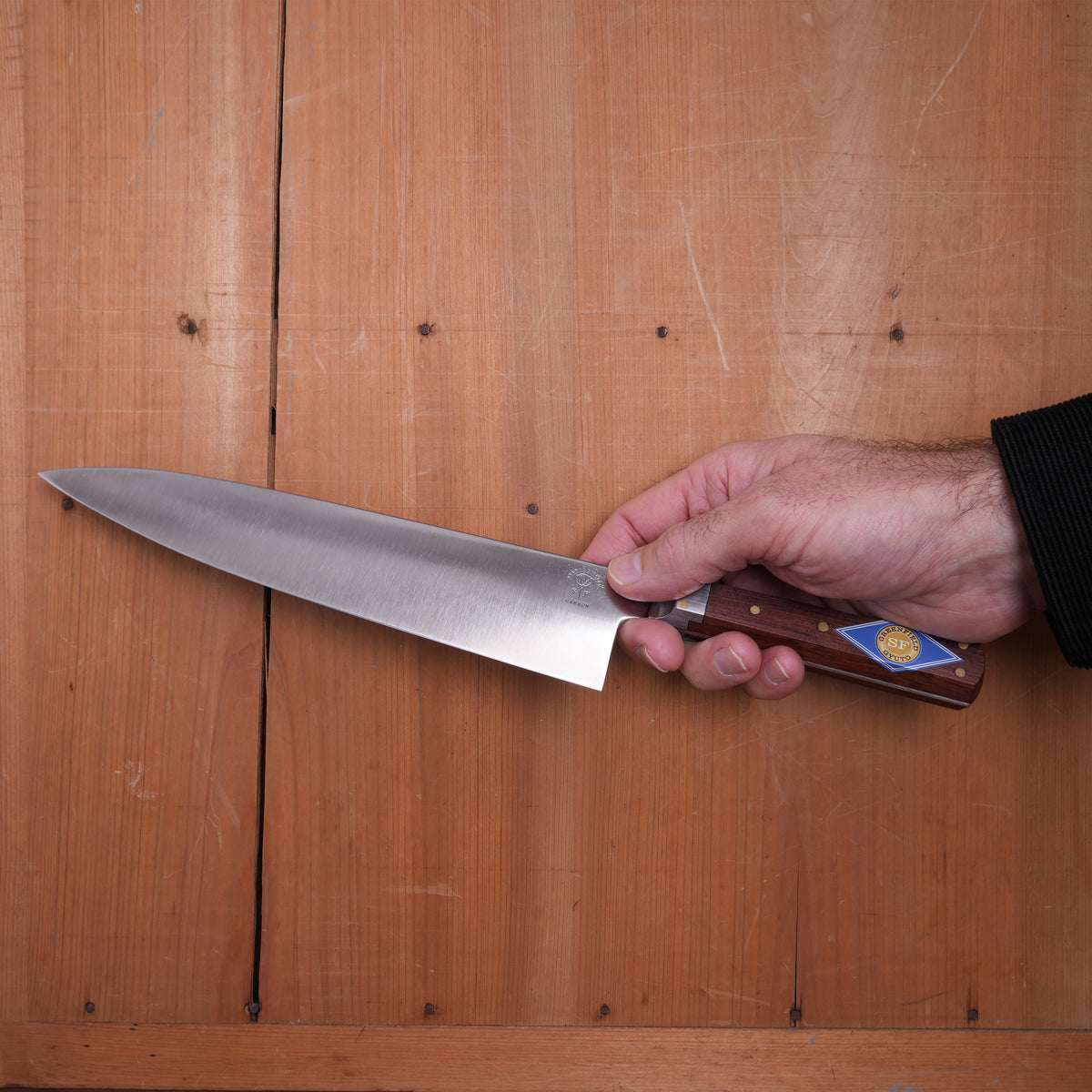
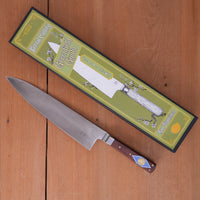
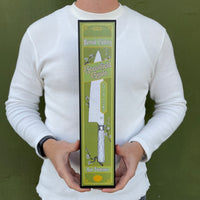
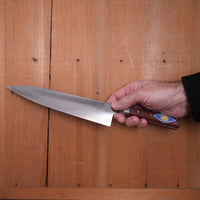
First Edition Greenfield Gyuto 9" Chef Knife Carbon Steel & Padauk
-
Prix ordinaire
-
$563.27
-
Prix soldé
-
$563.27
-
Prix ordinaire
-
SOLDES
Épuisé
-
Prix unitaire
- /par
- Prix ordinaire
- $563.27
- Prix soldé
- $563.27
- Prix ordinaire
- Prix unitaire
- /par
The Greenfield Gyuto is a blend of skilled hand labor and precise industrial methods; hand-finished with a convex geometry and hafted with rabbet-milled bolsters, and a durable and low-environmental-impact tropical hardwood. The blades are available as a non-stainless tool steel alloy with good toughness and edge retention or in AEB-L Swedish stainless steel with fine edge formation, excellent stain resistance, and easy sharpening. The Greenfield Gyuto is tempered hard in the Japanese manner, but not too much so as to keep it from stepping up to the demands of a professional kitchen.
The quintessentially practical Yankee handle offers a comfortable, versatile grip and a strong construction which has not been manufactured since the days of the great knife-making towns of New England.
The Greenfield Gyuto also pays double homage to the Greenfield neighborhood of Pittsburgh, Pennsylvania, where Bernal Cutlery co-founder Kelly Kozak grew up in the 70s and 80s. A daughter and granddaughter of Pittsburgh Steelworkers, she has long dreamed of bringing a connection to our work here at Bernal Cutlery with the history of American steelmaking. To read more about how this knife came to be click here.
Brand: Bernal Cutlery
Producing Area: USA
Profile: Gyuto
Size: 9" / 229mm
Blade Type: Mono Carbon Steel
Steel Type: Carbon Steel
Handle: Padauk with stainless bolster and brass pins
Total Length: 14" / 356 mm
Blade Height: 2" / 51 mm
Edge Length: 9" / 229 mm
Weight: +/- 220g
Hand Orientation: Ambidextrous
Saya: Guard Included
HRC: 62
*Please note this is the first production run of the Greenfield Gyuto. It is being made in a small quantity and future models may vary. Please note blades and handles are hand finished and slight variation and signs of hand work should be expected.
Knife Care:
The Greenfield Gyuto is tempered and ground in the style of a Japanese chef knife which is designed to work with precision on vegetables, boneless proteins, etc., items that are not excessively hard or require hacking to cut. The edge can be damaged on frozen food, bones, shells, pits etc. As a good rule of thumb, if you wouldn’t bite it, don’t use the Greenfield Gyuto on it.
Sharpening is best done with Japanese whetstones, finishing between 3000 and 8000 grit depending on the user's preference. Ceramic honing rods or high quality medium- to fine-cut sharpening steels are great for keeping the edge lively in between sharpenings. Avoid pull-through sharpeners and be choosy about which professional sharpener works on this knife. Send it to Bernal Cutlery for maintenance if possible.
For cutting boards, Japanese softwood and end-grain hardwood are preferable, although some long-grain hardwoods are fine to use. Avoid bamboo and hard composites, which will reduce the edge life. Higher end Japanese synthetics are preferable to low cost plastic boards (but wood is more hygienic).
Tool steel alloys are sometimes referred to as 'semi-stainless' since they rust slower than simpler carbon steel alloys, but are not fully stainless and need basic care. Water is the primary agent of rust, but foods that have a very acidic or basic pH, or are high in salt will increase reactivity during cutting. Wipe the blade dry during heavy use and after washing (Soap is OK, but avoid using the abrasive side of the sponge if possible.) Always avoid soaking, and keep out of dishwashers.
Carbon steel will form a patina with careful use. This is a light layer of oxidation which forms before rusting. Some cooks prefer to remove it often, while others like to cultivate it. We think patina looks cool and offers a first layer of protection against rust. If active orange rust forms, remove it with the finest non-corrosive abrasive possible. Coarse abrasives will invite further rust by creating scratches where water can get trapped. To remove a light rust, we like to apply the mud formed from fine, Japanese, finishing stones to a rag and gently polish it off. Silver polishing pastes with silica will function in the same way. For deeper, heavier rust, use stronger abrasives like a fine sandpaper or non-corrosive scouring powder.
This listing is for Pre-order only. Shipment date is estimated to be between 1/15/2024-2/15/2024
This is a carbon steel knife. Carbon steel is expected to develop a dark patina with use. It needs to be hand washed and towel dried soon after use. Do not air dry. Do not put it in the dishwasher. Long exposure to moisture and debris will result in rust. Any rust development should be removed with a light abrasive.
Use on a quality wooden cutting board will help the knife stay sharper for longer. Use on hard surfaces like plates and bamboo will reduce the edge life and can result in edge damage.
We recommend hand sharpening on whetstones. We have found that most western knives perform best with a medium finish starting around 1000 grit. Avoid pull through sharpeners and non-water cooled mechanized sharpening. Steel honing rods work well with this knife.
Recently Viewed
About Bernal Cutlery
We are a full-service cutlery shop offering sharpening services, Japanese and Western culinary knives, vintage knives, outdoor, pocket and craft knives, cooking tools and accessories. We also offer knife skills and sharpening classes, and more.
We are proud to serve kitchen professionals, knife enthusiasts and home cooks alike. Located in the Mission District of San Francisco, California.
766 Valencia Street, SF, CA 94110
1 Ferry Building, Ste. 26, SF, CA 94110
